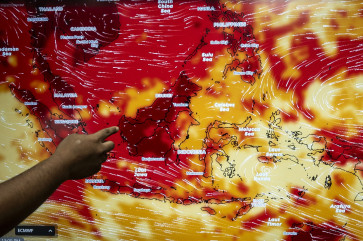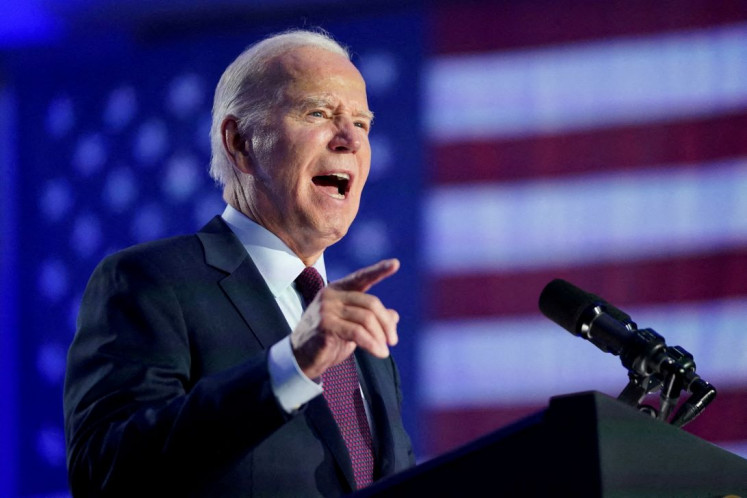RI wants slice of Japan’s pie
The archipelago and the rising sun: President Joko “Jokowi” Widodo talks with visiting Japanese Prime Minister Shinzo Abe during their meeting at the Bogor Presidential Palace in West Java on Sunday
Change Size

T
span class="inline inline-center">The archipelago and the rising sun: President Joko “Jokowi” Widodo talks with visiting Japanese Prime Minister Shinzo Abe during their meeting at the Bogor Presidential Palace in West Java on Sunday.(JP/Wendra Ajistyatama)
Amid a persistent decline in bilateral trade, Indonesia is seeking wider entry into Japan’s markets by requesting the latter to lower its trade barriers during a high-level meeting between the countries’ leaders.
In a joint press statement after a bilateral meeting with Japan’s Prime Minister Shinzo Abe, President Joko “Jokowi” Widodo emphasized Japan’s importance as a strategic partner, especially in the economic, trade and investment sectors, including hopes that those relations would strengthen in upcoming years.
He, however, explained that Indonesia had also requested Japan to lower tariff barriers for its agriculture and fisheries shipments, which currently stand at more than 10 percent.
“Indonesia has asked Japan to open access for Indonesia’s agriculture and fisheries products,” he said at the Bogor Presidential Palace in West Java on Sunday.
Indonesia’s overall exports — including agricultural and fisheries products — to Japan have been steadily falling since 2011, as shown by data from the International Trade Center (ITC).
Total exports stood at US$33.71 billion in 2011 but have since dropped by almost half to $18.01 billion in 2015.
Such a drastic drop has triggered the government, business players and economists to call for measures to revive trade between the two countries, especially with the Indonesia-Japan Economic Partnership Agreement (IJEPA) being underutilized despite having existed since 2008.
The two parties seemed to acknowledge the underutilization of IJEPA as President Jokowi said both countries had agreed to start a review of the partnership.
Since IJEPA’s inception, Indonesia has failed to lower its import tariff on cars from Japan as stipulated in IJEPA. Indonesia had agreed to cut its 45 percent tariff on some 3,000 cc Japanese passenger cars to 20 percent by the start of 2015.
Jokowi also said Indonesia and Japan had agreed to review an agreement signed in 1982 by the two countries on the avoidance of double taxation and the prevention of fiscal evasion with respect to taxes on income.
The move to review both IJEPA and double taxation aims to promote higher investment flow between both countries amid uncertainty in the global economy.
Japanese companies have complained over the unclear tax regulations that have discouraged them from investing more.
Despite the global economic slowdown, Japan has remained the second highest foreign investor in Indonesia.
Japan’s investment in Indonesia reached $4.5 billion during the first nine months of 2016, almost double the amount of realized investments in the previous year.
The automotive sector has made up the bulk of Japan’s investments in Indonesia, followed closely by the industrial sector, metal sector, electronic sector and machinery sector.
Prime Minister Abe underlined Japan’s strength in infrastructure development, specifying a desire to continue to be involved in the train and electricity procurement sectors.
“Japan will cooperate in the train and electricity sectors, among others, through the development of high-quality infrastructure that has continued to be Japan’s strength,” he said.
Japan has set its sights on several high-profile infrastructure programs, including the Patimban deep-sea port in West Java and the medium-speed Jakarta-Surabaya railway.
Transportation Minister Budi Karya Sumadi said the Indonesian government had offered Japan a chance to submit early proposals for both the Patimban Port and the Jakarta-Surabaya railway projects.
Furthermore, the two countries have agreed to establish a joint venture agreement to operate the Patimban Port.
“We have asked that the Patimban project start construction in the beginning of 2018 at the latest and start its operations in phases at the beginning of 2019,” he said.
Meanwhile, the development of the gas-rich Masela block remains vague as Energy and Mineral Resources Minister Ignasius Jonan said the government would stick to its guns and only offer a seven-year contract amendment for Japanese energy company Inpex as compensation for the time lost following the Indonesian government’s decision to change the project to onshore development from offshore development.
However, a six-month feasibility study will soon commence to determine whether or not it would be more economically feasible to develop one of the region's biggest gas resources.
Jokowi also said he had requested that Abe allow state airline Garuda Indonesia to serve a Jakarta-Los Angeles, United States, route, connecting through Tokyo.
Sunday's meeting was the sixth since Jokowi took office in October 2014.
Despite both countries’ enthusiasm for boosting stronger economic ties, Yasuhisa Kawamura, press secretary and director general for press and public diplomacy at Japan’s Ministry of Foreign Affairs, confirmed that no deals had been signed during the bilateral meeting.
“Today [Sunday], we haven’t signed any documents. However, the projects we have mentioned have been ongoing,” he said.
_________________________________
Indonesia-Japan key economic points
Trade and Investment
* Both leaders reaffirmed their resolution to be consistent with international rules and incessantly improve domestic business environments
* Both leaders confirmed the important role played by the Indonesia-Japan Economic Partnership Agreement (IJEPA) in promoting trade and investment relations
* Both leaders reiterated the importance of reviewing the agreement between Indonesia and Japan for the Avoidance of Double Taxation and the Prevention of Fiscal Evasion
* Japan-RI to cooperate toward conclusion of modern, comprehensive, high-quality and mutually beneficial Regional Comprehensive Economic Partnership (RCEP) Agreement
* Japan to provide more than US$635 million in financing for the development of Indonesia's irigation and marine conservation
Java Northern Line Upgrade project
* Both leaders welcomed the upcoming joint effort between Japan and Indonesia on upgrading the Java Northern Line.
Patimban Seaport project
* Both leaders welcomed the steady progress of preparation, including a detailed engineering design for the inception of construction of Patimban seaport.
Jakarta Mass Rapid Transit (MRT) project
* Prime Minister Abe expressed Japan’s intention to extend cooperation utilizing Japanese technology for projects of the North-South Line extension and East-West Line development
35 gigawatt (GW) program
* Prime Minister Abe expressed Japan’s strong commitment to furthering cooperation in the implementation of Indonesia’s 35 GW program through public and private activities
Java-Sumatra Interconnection Transmission Line project
* Both leaders expressed commitment to the Japan-Indonesia Joint Statement in 2015 and the implementation of the Java-Sumatra Interconnection Transmission Line Project.
Masela Gas Block development
* Both leaders affirmed the importance of accelerating and concluding negotiation as soon as possible in a mutually beneficial way on the Masela Gas Block development
Source: Foreign Ministry









